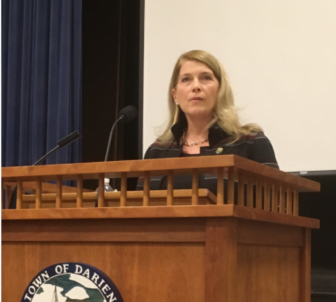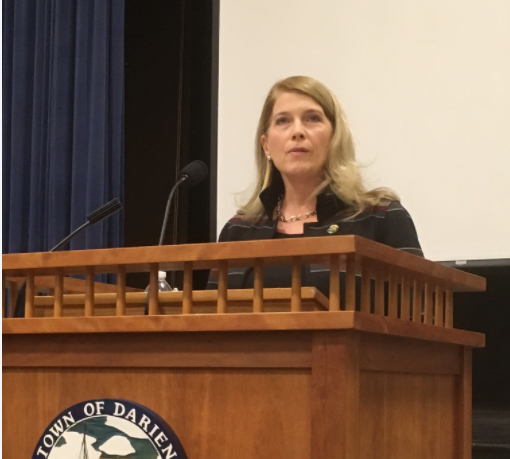The governor’s proposal for cities and towns to fund one third of the state teacher pension system is unfair, arbitrary, and possibly illegal under the state Constitution, First Selectman Jayme Stevenson says in testimony to a Legislature committee

Photo from Darien TV79
First Selectman Jayme Stevenson giving her 2016 State of the Town address
Over two years, Stevenson said in prepared comments for testimony she expects to give today, Darien will owe the state $8 million, and statewide the proposal will create the third-largest tax increase in state history.
Stevenson also asked whether or not cities and towns that would be contributing to the retirement fund would get a say in how it is managed, whether the state would meet its own obligations for the other two thirds of the funding, and whether the pension plan administration will be transparent.
She recommended rejecting the proposal at least until a lawsuit regarding fair education funding, CCJEF vs. Rell, is decided, as expected, by the state Supreme Court.
Stevenson, who is chairman of the Western Connecticut Council of Governments, was scheduled to testify Thursday, March 9 before the Finance, Revenue and Bonding Committee. These are her prepared remarks:
OPPOSE – Governor’s Bill 7050, AN ACT CONCERNING ENHANCEMENTS TO MUNICIPAL FINANCE AND ACCOUNTABILITY— In its entirety and specifically Section 27 relating to municipal contributions to the state’s teachers’ retirement system
Good Morning Senators Frantz, Fonfara, Representative Rojas, Ranking Member Davis, Darien Delegation members Senator Leone and Representative Wood and Members of the Finance, Revenue and Bonding Committee.
On behalf of Darien teachers and taxpayers, I oppose the shift of funding responsibility for the state-run, state-managed Teachers’ Retirement Fund to Connecticut cities and towns.
While the bill’s language defines the proposed municipal contribution as a “reimbursement to the state” the objective is clear: to bail out the state’s chronic, decades-long, bipartisan underfunding and mismanagement of the Teachers’ Retirement Fund.
This proposal is inconsistent with state statute, breaks the state’s statutory commitment to our hard working teachers and undermines the fiscal stability of towns like Darien who pride ourselves on conservative spending, investment and reserves policies earning us the highest available bond rating.
Taken in aggregate, with the restructuring of education funding and other state grants proposed by the governor, the town of Darien will be a net payer to the state of Connecticut, owing over $8 million over the biennium. Notably, Darien will lose all but $95,000 in education and special education funding — less than the cost of one high-needs student.
For the record, I believe the civil rights of all special needs students will be violated by the imposition of discriminatory wealth metrics in determining special education reimbursement funding.
Without gutting town services, the likely impact will be the third largest tax increase in the state’s history as a result of these state mandates. Setting aside issues of legality, the pension proposal raises more questions than the supporting legislation answers:
- Is this proposal consistent with the Connecticut Superior Court CCJEF vs. Rell decision and anticipated Supreme Court Appeal actions?
- What is the methodology behind asking towns to pay 1/3 the annual pension cost? Why not half? 100 percent?
- What certainty can be granted to cities and towns that added fiscal pressures will not alter the contribution percent in the future, creating annual local budge chaos?
- Will the state guarantee that the monies we pay will be used to fund teacher pensions and not for some other purpose?
- Will the state make its full 2/3 pension contribution this year, and will these monies also be used exclusively to fund teacher pensions?
- Will our pension contributions buy us a voice at the pension management and negotiation table? If not, why?
- What assurances will be given that pension terms will not be relaxed now that towns are contributing?
- What transparency policies will be instituted to demonstrate accountability for the money you are taking and how will you report to contributing municipalities?
- What do we get in exchange for our financial “skin in the game”? The guarantee of better management? A detailed reporting plan to ensure that municipalities can monitor the success of this proposal? A seat and voice at the state teachers’ pension table? Significant mandate relief?
I urge the Finance Committee to reject the Governor’s pension cost sharing proposal and instead wait for final recommendations resulting from the CCJEF vs. Rell case before restructuring the way the state of Connecticut funds public education, particularly for special needs students.


